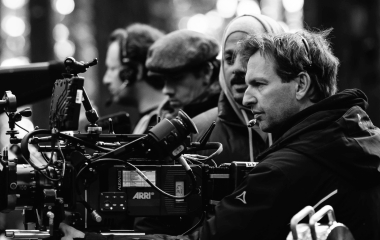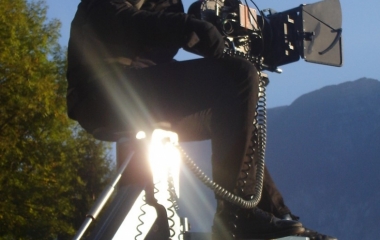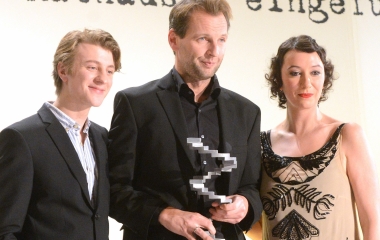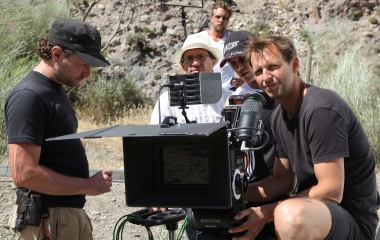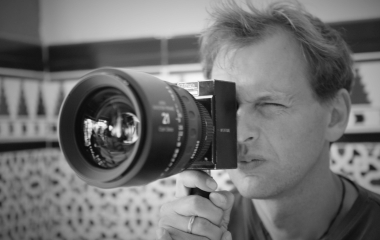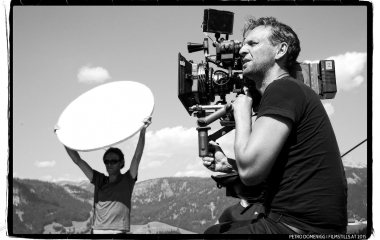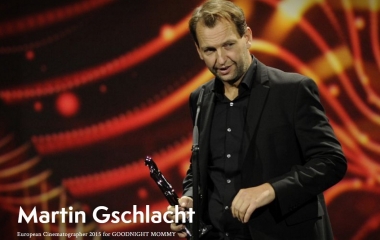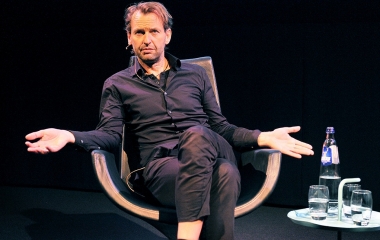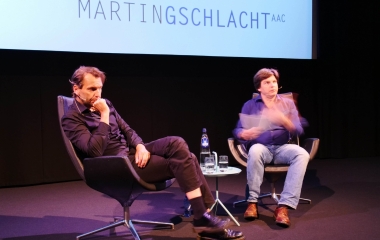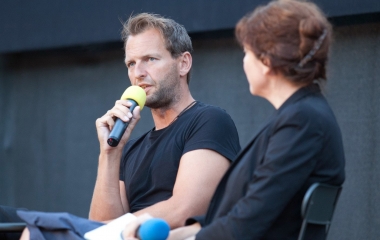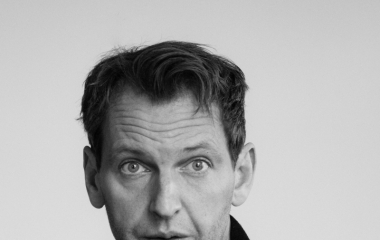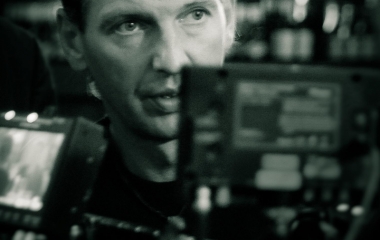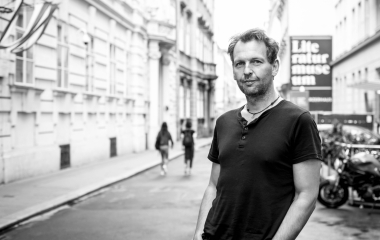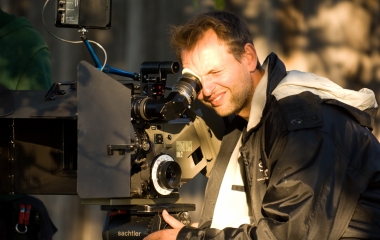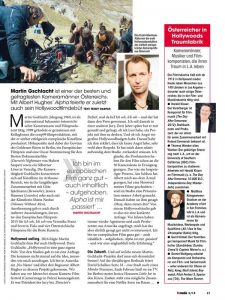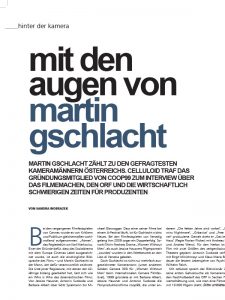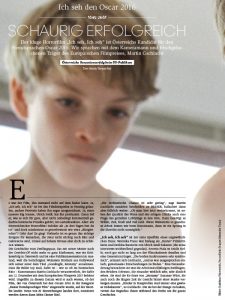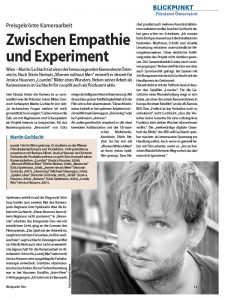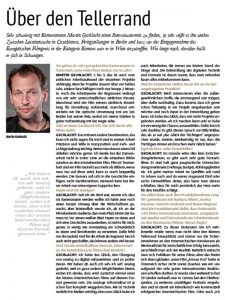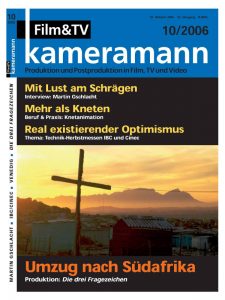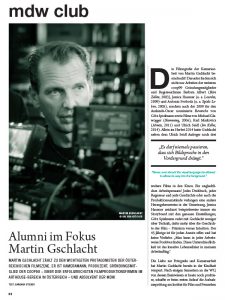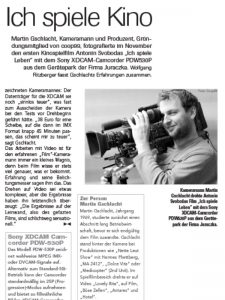
Martin Gschlacht
Director of Photography
Martin Gschlacht’s work behind the camera has also focused on feature film production in the arthouse sector. So far he has wielded the camera on around 50 films, including long-term collaboration with successful Austrian directors such as Götz Spielmann (Oscar nominated for Revanche), Jessica Hausner (Lourdes, Little Joe…) and the respected artist Shirin Neshat. Working with Barbara Albert, Ulrich Seidl, Michael Glawogger, David Schalko Antonin Svoboda, Florian Flicker, Erwin Wagenhofer and Karl Markovics has been an important aspect of his creative work in the cinema. In 2018 Alpha by Albert Hughes, Martin Gschlachts first camera work for a US major studio was released 2018 in cinemas worldwide.
Personal recognition has come in the form of numerous camera prices including the 2015 European Film Award (for Goodnight Mommy by Veronika Franz and Severin Fiala), 4 Austrian Film Awards for best Cinematography and the internationally renowned Golden Camera 300 at the Manaki Brothers Cinematographers Film Festival.
Die Kameratätigkeit Martin Gschlachts konzentriert sich von Anbeginn ebenfalls auf Spielfilmproduktionen im Arthouse Bereich. Er zeichnet bisher für rund 50 Filme und Serien verantwortlich, darunter die langjährige Zusammenarbeit mit erfolgreichen Österreichischen Regisseur*innen wie Götz Spielmann (ebenfalls eine Oscar-Nominierung für „Revanche“), Jessica Hausner („Lourdes“, Little Joe“…) oder mit der renommierten US-Künstlerin Shirin Neshat. Arbeiten mit Barbara Albert, Ulrich Seidl, Michael Glawogger, David Schalko, Antonin Svoboda, Florian Flicker, Erwin Wagenhofer, Julian Pölsler, Valentin Hitz und Karl Markovics sind wichtiger Bestandteil seines Schaffens. 2018 kam mit „Alpha“ von Albert Hughes Martin Gschlacht’s erste Kameraarbeit für ein US Major Studio weltweit in die Kinos.
Anerkennung gab es auch durch mehrere Kamerapreise, darunter den Europäischen Filmpreis 2015 (für „Ich Seh / Ich Seh“ von Veronika Franz und Severin Fiala), 4 Österreichische Filmpreise, zwei Romys sowie den international renommierten Kamerapreis „Golden Camera 300“ am Camera Filmfestival Manaki Brothers.
Cinema
Des Teufels Bad / The Devil's Bath - Severin Fiala, Veronika Franz (AT/GB/DE, in production)
Hochwald / Why not you? - Evi Romen (AT/IT/BE 2020)
Little Joe - Jessica Hausner (AT/GB/DE 2019)
Alpha - Albert Hughes (US 2018)
Looking for Oum Kulthum - Shirin Neshat (DE/AT/US 2018)
Tehran Taboo - Ali Soozandeh (DE/AT 2017), Animation
Stille Reserven / Hidden Reserves - Valentin Hitz (AT/DE/CH 2016)
Drei Eier im Glas - Antonin Svoboda (AT 2015)
Ich seh, Ich seh / Goodnight Mommy - Veronika Franz, Severin Fiala (AT 2015)
Vampir auf der Couch / Therapy for a Vampire - David Rühm (AT/CH 2014)
Im Keller / In the Basement - Ulrich Seidl (AT 2014)
Amour Fou - Jessica Hausner (AT/LU/DE 2014)
Cure – The Life of Another - Andrea Staka (CH/BA/HR 2014)
Oktober November / October November - Götz Spielmann (AT 2013)
The Strange Case of Wilhelm Reich - Antonin Svoboda (AT 2013)
Die Wand / The Wall - Julian Pölsler (AT/DE 2012)
Grenzgänger / Crossing Boundaries - Florian Flicker (AT 2012)
Atmen / Breathing - Karl Markovics (AT 2011)
Black Brown White - Erwin Wagenhofer (AT 2011)
Women Without Men - Shirin Neshat (DE/AT/FR/US 2009)
Lourdes - Jessica Hausner (AT/FR/DE 2009)
Was du nicht siehst / What You Don’t See - Wolfgang Fischer (DE/AT 2009)
Revanche - Götz Spielmann (AT 2008)
Immer nie am Meer / Forever Never Anywhere - Antonin Svoboda (AT 2007)
Slumming - Michael Glawogger (AT/CH 2006)
Spiele Leben / You Bet Your Life - Antonin Svoboda (AT 2005)
Hotel - Jessica Hausner (AT/DE 2004)
Antares - Götz Spielmann (AT 2004)
Böse Zellen / Free Radicals - Barbara Albert (AT/DE/CH 2003)
Kaltfront / Coldfront - Valentin Hitz (AT 2003)
Lovely Rita - Jessica Hausner (AT/DE 2001)
Luna Papa - Bachtiar Khudoinazarov (AT/DE/RU/CH 1999)
Television
Tatort – Das Tor zur Hölle - Thomas Roth (2021, in production)
Der Weiße Kobold - Marvin Kren (2021, in postproduction)
Ich und die Anderen - David Schalko (AT, DE 2021) TV-series
Letzter Kirtag - Julian Pölsler (AT 2020)
Dark Cargo - Lodge Kerrigan (US, in postproduction)
Wiener Blut - Barbara Eder (AT 2019)
M - eine Stadt sucht einen Mörder - David Schalko (AT/DE 2019), TV-series
Bergfried - Jo Bayer (DE/AT 2016)
Das Geheimnis der Hebamme - Roland Suso Richter (DE/A 2016), TV mini-series
Die Schatten, die dich holen - Robert Dornhelm (DE/AT 2010)
Geliebter Johann, geliebte Anna - Julian Pölsler (AT 2010)
Daniel Käfer und die Schattenuhr - Julian Pölsler (AT 2007)
Spiel im Morgengrauen - Götz Spielmann (AT 2001)
Dolce Vita & Co - Erhard Riedlsperger (AT 2000), TV-series
Other
Interdependence, Segment 'Kingdom' - Bettina Oberli (CH 2019) Anthology Film
The Field Guide To Evil, Segment 'Die Trud' - Veronika Franz, Severin Fiala (NZ 2018), Anthology Film
Aida - Shirin Neshat (AT 2017), Opera/Visuals
Faezeh / Munis / Fahrit / Zarin - Shirin Neshat (FR/US 2006-2008), Art Installations
Das gefrorene Meer / The Frozen Sea - Lukas Miko (DE/AT 2007), Short
Im Anfang war der Blick / In the Beginning was the Eye - Bady Minck (AT/LUX 2002)
“VB 45” - Vanessa Beecroft (US 2000), Installation
Inter-View - Jessica Hausner (AT 1999), Short
Ratrace - Valentin Hitz (AT 1999), Short
Ö1 Intermezzo 2015
TEIL 1:
TEIL 2:
„Romy” Best Cinematography TV-feature 2019 for M - Eine Stadt sucht einen Mörder
„Austrian Film Award 2017” Best Cinematography for Stille Reserven / Hidden Reserves
„Austrian Film Award 2016“ Best Cinematography for Ich seh, Ich seh / Goodnight Mommy
„European Cinematographer 2015” European Film Award for Ich seh, Ich seh / Goodnight Mommy
“The photography in 'Goodnight Mommy' is extremely consistent and suggestive. Every frame is created in the atmosphere of the film and strengthens its dramaturgy. These pictures are testimony to the huge visual sensitivity of the cinematographer. They are an excellent example of the use of composition and light and offer a new, very modern understanding of the art of cinematography.”
„Best Cinematography BAFICI 2015“ for Ich seh, Ich seh / Goodnight Mommy
“Firstly, for his excellent work in exploring his resources, when exposing the 35mm negative. He shows and hides the different spaces in which the terrifying plot develops, without resorting to chiaroscuro. Furthermore, for the icy surgical precision with which he accompanies the growing rarified relationship between the leading twins and their mother, who becomes step by step stranger to them. Finally, because the construction, through the scenography, cinematography, and staging of the camara, of the alienating and cold loneliness in which the plot develops, turns out to be crucial for the film to fit the psychological horror genre.”
Asociación de Argentina de Autores de Fotografía Cinematográfica
„Austrian Film Award 2013“ Best Cinematography for Grenzgänger /Crossing Boundaries
„Austrian Film Award 2011” Best Cinematography for Women Without Men
„Golden Camera 300“ Int. Camera FF, Manaki Brothers, 2010 for Women Without Men
“If there was ever a perfect lighting and composition for a certain movie, this film shows what that lighting and composition could do. It used old and new techniques of expressing an atmosphere of past and present of a specific political situation of a nation”
Vilmos Zsigmond, President of the Jury
„Best Cinematography“ Interantional Film Festival Zadar, 2010 for Lourdes
“Best Director of Photography: Martin Gschlacht in the film 'Lourdes', whose visual language increases the impression of the dramaturgy and the plot of the film in a way that is unobtrusive.”
„Best Cinematography“ RiverRun International Film Festival, 2010 for Lourdes and Women Without Men
„Romy” Best Cinematography TV-feature 2010 for Geliebter Johann, geliebte Anna
„… Martin Gschlacht ist ein Handwerker der stilistischen Veredelung. Er hat ein subtiles Gespür für zwischenmenschliche Situationen, das zeigt seine ganz besondere Qualität…“
„Golden Lola”, Best German Short Film 2007 for Das gefrorene Meer/The Frozen Sea (Producer/Cinematographer)
„Diagonale-AAC Award“ Best Cinematography Fiction 2007/2008 for Revanche
„Mit seinen Bildern erschafft er einen filmischen Raum voller Spannung und Dichte. Stringenz in der Wahl der Perspektiven und der Mut, die Grenzen der Lichtsetzung auszuschöpfen, halten den Zuschauer von der ersten Einstellung an in Bann und machen 'Revanche' zu einem intensiven Kinoerlebnis.“
„Diagonale-AAC Award“ Best Cinematography Fiction 2005/2006 for Spiele Leben / You Bet Your Life
„Ausgezeichnet wird eine Kameraführung, die einfach und genau eine unaufdringliche Sinnlichkeit entfaltet und dadurch einen angemessenen visuellen Rahmen für die Figuren und die Geschichte schafft.“
„Bronze Camera 300“ Intl. Camera Film Festival, Manaki Brothers, 2004 for Hotel
“The Bronze “Camera 300” goes to the cinematographer Martin Gschlacht, for the film 'Hotel', by the director Jessica Hausner, for the creativity with which, through the economy of resources, in a hyper realistic style, and through simplicity of approach the solitude and isolation of the characters is created.”
Cesar Charlone, President of the Jury


